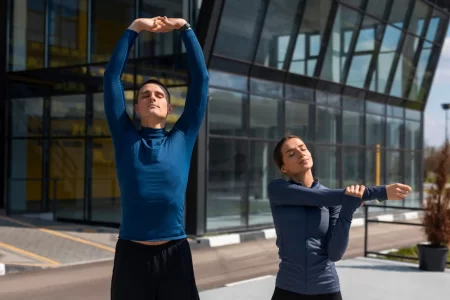 Anxiety is a common and often debilitating condition that affects millions of people worldwide. While there are various treatment options available, one effective and natural approach to combating anxiety is through regular exercise.
Anxiety is a common and often debilitating condition that affects millions of people worldwide. While there are various treatment options available, one effective and natural approach to combating anxiety is through regular exercise.
Physical activity has been shown to reduce stress, improve mood, and boost overall mental well-being. Today, we will explore the relationship between exercise and anxiety, and delve into different types of exercises that can help alleviate anxiety symptoms.
Let’s discover how you can beat anxiety through the power of exercise.
Understanding the Connection
Anxiety is closely linked to our body’s stress response system, which triggers the release of stress hormones such as cortisol. Exercise acts as a powerful counterbalance to this stress response, as it helps release endorphins, the body’s natural mood enhancers.
By engaging in physical activity, we can effectively reduce the levels of stress hormones while simultaneously promoting the production of feel-good chemicals, which can lead to a significant reduction in these symptoms.
Aerobic Exercises
Aerobic exercises, such as running, cycling, swimming, or brisk walking, are excellent choices for combating anxiety. These activities increase your heart rate and promote deep breathing, which help activate the body’s relaxation response.
Aim for at least 30 minutes of moderate-intensity aerobic exercise most days of the week to experience the anxiety-reducing benefits.
Strength Training
Engaging in strength training exercises, such as weightlifting or bodyweight exercises, not only builds physical strength but also bolsters mental resilience. By challenging your body, you can boost self-confidence and improve self-esteem, which can alleviate anxiety symptoms.
Aim for two to three sessions of strength training per week, targeting major muscle groups, and gradually increase the intensity over time.
Mind-Body Practices
Mind-body practices like yoga, tai chi, and Pilates offer a unique blend of physical movement, breath control, and mindfulness.
These exercises promote relaxation, reduce muscle tension, and enhance body awareness, helping to alleviate anxiety. Additionally, the mindfulness aspect of these practices trains the mind to stay present and focused, reducing anxious thoughts.
Incorporate mind-body practices into your routine, either through guided classes or online tutorials, and experience the holistic benefits they offer.
Outdoor Activities
Exercising in nature has been shown to have additional benefits for anxiety reduction. Spending time in natural environments, whether hiking, gardening, or simply taking a walk in the park, can have a calming effect on the mind.
The combination of physical activity, fresh air, and the beauty of nature can help reduce stress levels. Whenever possible, opt for outdoor exercises to maximize the therapeutic effects on your mental well-being.
Anxiety can be debilitating, but it doesn’t have to control your life. By incorporating regular exercise into your routine, you can take proactive steps toward managing and reducing anxiety symptoms. Remember, finding joy in the process is essential, so choose activities you enjoy and gradually increase the intensity as your fitness improves.
Picture Credit: Freepik
